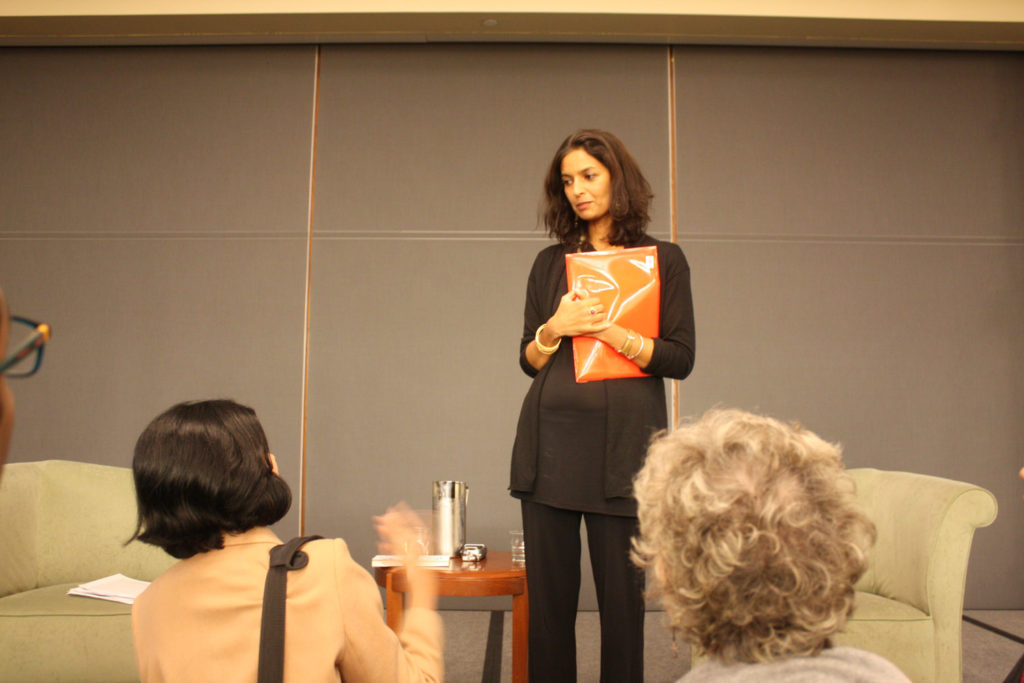
Lahiri answers audience questions after talking about her new book, In Altre Parole, written entirely in Italian.
Photo Credit: Kristen Bryfogle.
Travelling around the Greek Isles in a sailboat, swimming out to the middle of a lake without a life preserver, crossing a bridge in Venice, arriving naked and shipwrecked on a foreign island — these were all ways in which Pulitzer-Prize-winning author Jhumpa Lahiri described the process of learning a new language in her discussion of her newest book, In Altre Parole, at Montclair State University this past week.
Lahiri, who won the Pulitzer for Fiction in 2000 for her collection of short stories, Interpreter of Maladies, came to campus on Monday, Oct. 5 to participate in an event sponsored by the Theresa and Lawrence R. Inserra Chair in Italian and Italian-American Studies and the departments of Spanish, Italian, English and Classics and General Humanities.
The event, entitled “In Other Wor(l)ds: Jhumpa Lahiri on the Italian Language and Culture as a Place of Creative Freedom,” was the largest turnout that Inserra Chair holder and Associate Professor Teresa Fiore, who organized the talk, had ever seen, with over 500 students, faculty and guests, particularly from the Indian and Italian American communities, seated in the University Hall Conference Center to hear Lahiri speak about her creative process and her experiences in learning the Italian language.
Athough Lahiri previously wrote primarily in English and speaks both English and Bengali, she also had a lifelong connection to Italian culture and language. The first book she read in elementary school was about the Roman gods, she studied Italian Renaissance architecture for her PhD and she always possessed an intense desire to learn the Italian language.
The Italian language does need Jhumpa Lahiri for her respect and passion towards it, for her tenacious and yet delicate advocacy which make her into an accidental ambassador of the language and, by extension, of all foreign languages. – Dr. Teresa Fiore, Inserra Chair
“I felt that there was something horribly missing in my life without this language,” said Lahiri, “and I couldn’t explain it, even to myself. [Learning Italian] really was like falling in love with somebody, but you’ve never met them. I feel like I’m constantly courting the language, running behind it.”
In order to face the language head on, Lahiri and her family moved to Rome for three years, where she could be immersed in Italian. Lahiri shared that, during her first few weeks of living in Rome, she began keeping a diary and also making lists of useful language tips and reflections on what it was like to learn a new language, all in Italian. This marked her first venture outside of the English language as a writer.
“One day, I found myself in a library and I just started writing a short story in Italian,” Lahiri said. “I heard the whole thing in my head and I was just writing it down as I was hearing it.”
This writing, however, contained many errors which a tutor in Italian helped Lahiri to realize. Yet, Lahiri did not let her mistakes prohibit her from taking on the challenge of writing in a new language. She said, “I thought, ‘I don’t know how to do this at all, but I’m going to try.’”
[Learning Italian] really was like falling in love with somebody, but you’ve never met them. I feel like I’m constantly courting the language, running behind it. -Jhumpa Lahiri
Lahiri’s efforts to learn to write in Italian resulted in the creation of her entirely Italian text, In Altre Parole, which translates in English to “In Other Words.” Fiore described the book as “a compendium of metaphors” that depict what it is like to learn a new language as someone outside of that language’s culture.
In speaking about her use of metaphors, Lahiri asked the audience, “What is a metaphor? It’s a way of using another language, the language of an image, that allows you to reinform some experience.” The language of metaphor, then, was a fitting way for Lahiri to describe her own attempts to conquer another language.
Throughout the night, Lahiri expanded beyond her own creative process to discuss broader issues. In praise of her art of metaphor, Fiore said, “[Lahiri] constantly comes back with these really beautiful images about what it means to study Italian, to be able to be between languages, in another country [and] in another culture.” Beyond discussing the issue of being stuck between cultures as an Indian-American living in Italy, Lahiri also commented on immigration and emigration, particularly concerning the European refugee crisis, and the liberating and educating values of language.
‘I don’t know how to do this at all, but I’m going to try.’ -Jhumpa Lahiri on writing in Italian
The Inserra Chair has also invited students to follow in Lahiri’s footsteps by examining their own language-learning journey. The Chair is holding a contest until March 20, 2016, which will allow students to write their own metaphor about what it is like to learn Italian. Students can then submit their metaphor to the contest for a chance to win prizes.
Lahiri says in In Altre Parole, “I’m in love with Italian but what I love remains indifferent. The language will never need me.” Fiore, however, says that she “would actually contest that statement by saying that, in fact, the Italian language does need Jhumpa Lahiri for her respect and passion towards it, for her tenacious and yet delicate advocacy which make her into an accidental ambassador of the language and, by extension, of all foreign languages.”



